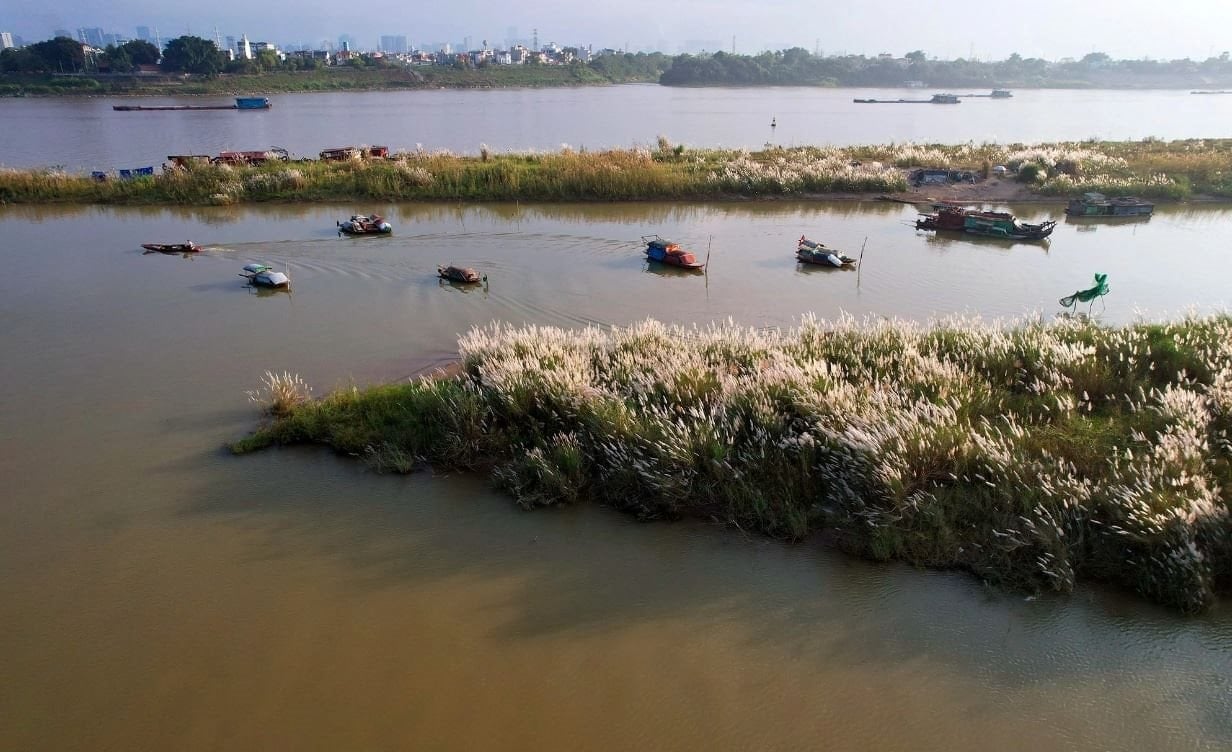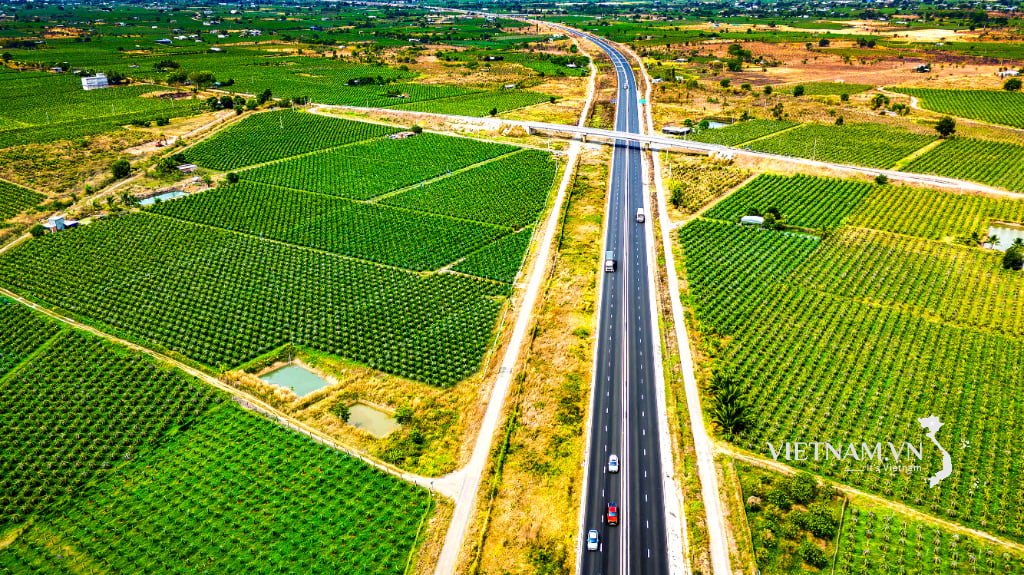In the countryside, the winter is cold, dry, and barren. The market on the embankment is deserted, the thatched roofs are swept by the wind. During the lean season, the riverbank is desolate, the village square is gloomy. Cold winds pass through the temple and shrine, the ancient, moss-covered trees hear the wind whistling through the leaves, and the last flowers of the season fall.

The iron boat sailed from the riverbank along the dusty dirt road back to the village.
People along the river toil tirelessly across distant docks, nearby fields, and land within the dike, regardless of sun or rain, to meet the planting season's deadlines, yet they remain poor. Poverty clings to everyone, regardless of surname, and cannot be measured by years or seasons, but by generations of villagers. The villagers sigh and wonder what kind of curse could be so profound.
Because: This section of the Day River is quite favorable. Like other villages, the people here grow corn, sugarcane, and other crops. When they don't work the land, the villagers have other side jobs: making molasses, collecting scrap metal, and buying, transporting, and trading agricultural and forestry products—what the villagers call "going against the current." Other villages thrive on just one trade, but this village has many trades and is still poor.
Let's talk more about the villagers' "reverse journeys." Trucks traveling the Northwest route in the past often had to cross the Dong Mai ferry. Staying in the fields or collecting scrap metal sometimes slowed them down and wasn't enough to attract those restless, adventurous souls, so they "jumped" into the cab of a truck to explore new lands.
Initially, one person from a family went out alone to scout out potential buyers and try their luck with a single shipment. Surprisingly, they made a profit equivalent to a hundred kilograms of corn. So they took the risk and continued with subsequent trips, inviting relatives and friends to join them. Gradually, the profits became addictive; they couldn't resist going. Partly because they missed the journeys, and partly because only by traveling against the current could they see the potential for profit and dare to hope for a decent living.
Village gossip is hard to keep secret, and the women, not wanting to be outdone, abandoned their baskets and fields to follow their husbands "in the opposite direction." They feared that the money scattered along the way would run out, not to mention the possibility of losing their children as well, which could ruin their families. Some bolder women, after careful consideration, chose the long journey over staying in their village. Their goods were transported by truck to Mai Linh town and then sold wholesale to the provinces, with nothing missing. Many villagers married into other families or established businesses in foreign lands, but whether successful or struggling, they always found a way to return to the village. Relatives and friends clung to each other, working the land and calling out the heartfelt cry, "Anyone selling chicken or duck feathers?" throughout the neighboring villages.
So this land has three secondary occupations. The "counter-intuitive" occupation, which arrived last, flourished the fastest, becoming deeply ingrained in the villagers' lives as long-established occupations faded and gradually disappeared.
That's why people from the surrounding area, both from the earlier and later landing places, always tend to make comparisons when commenting on the village, offering much praise but sometimes even revealing jealousy.
It is said that: The common river flow makes the women of this riverbank far more beautiful than those of other banks. There are sighs of lament, "Can beauty be eaten? We'll only know when we have enough to eat and wear." No one dares to say when that will be, but it is known that the village girls are beautiful without showing off, a captivating beauty even amidst the hardships of life, and they are also capable and therefore cherished. People from every bank hope to become sons-in-law of the Mai Linh ferrymen, regardless of how poor that land is.
From Mai Linh ferry, one can see the fields of Nhan Hue, Nhan Son, and Y Son villages, where sugarcane grows abundantly, reaching headfirst to the top. Rain makes the stalks long and thick, while sunshine makes them intensely sweet. Even the sharp sugarcane leaves, like knives, cannot stop the village girls from cutting and bundling them, loading them onto ox carts to take back to the village. The village has no paved roads; generations of ox carts have worn down the stones on the path, smooth and uneven, covered in black dirt and debris. The trees are bare, their trunks gnarled, wild pineapples have long, sprawling leaves, and chickens and snakes lurk in the bushes. Children passing by look into the hollows of the trees with a hint of fear. But each season, when the duoi fruit is laden with golden berries, the bo ro fruit with its delicious, nutty kernels, or the milky-white sap of the cow's udder fruit with its astringent yet tasty taste, or sometimes when the golden morning glory vines spread across the groves, reaching out to grab and gather them… the children forget all their worries. They are captivated by the hedges and the few gifts nature bestows upon them.
These were the alleyways, the hedges, the boundaries of our land and others'. Children grew up running along the riverbanks, roaming through the villages and hamlets, tending to the trees and herding cattle, playing with the cows as if they were close friends. Then, both boys and girls became skilled with ox carts, carrying sugarcane, corn, and lime all the way to Tram Mountain and Sai Mountain to sell, and transporting bricks and tiles from Chuc and Got to build new houses, creating warm homes for young couples to marry.
The sound of cows mooing echoed throughout the village, their golden humps sometimes scraped from being dragged along by the shoulders; the cows were in pain, and the people felt sorry for them.
During the harvest season, the oxen munched on the delicious sugarcane tops, working twice or three times as hard as the humans. Besides transporting sugarcane back to the village, they also went around pulling sugarcane stalks to collect the molasses. The molasses filled the village with its fragrant aroma; the villagers were so busy that few enjoyed it, yet they remembered it. A sweet, fragrant memory, a memory passed down through generations, permeating the few tiled-roof houses in the village.
The poor homeland remains in our memories, in the baggage carried by the villagers as they fly back to the land of white clouds from this place.
Other villagers are so clever, choosing easy jobs that bring in a lot of money, while the people here are so destined for difficult jobs. And then there's the scrap metal collecting business. While the men are busy with work at the fields and on the river, the women and girls are busy going to the market on their free days. They don't just go to the market on the 3rd of August, when they're free from farming, but also on special occasions like feasts and religious ceremonies. Everyone looks forward to duck season, when every family eats fresh duck meat, and the women collecting scrap metal also make a profit from buying feathers. Buyers wonder, and the children selling duck feathers ask countless times:
Why didn't you buy chicken feathers?
- But the collectors won't buy them, what can you do?
Some people say, "Because chicken feathers can't be used to make wool, people don't buy them." Both sellers and buyers regret it for a long time. It must be said that even the youngest people who regretted losing chicken feathers back then now have gray hair.
The paths along the dikes and village lanes were worn down by the footsteps of mothers and sisters. Even those who traded their old sandals for new ones dared not take even one pair to wear. No sandals could endure such long journeys on foot, carried only by feet tirelessly searching and accumulating every penny and cent to bring home to support their elderly mothers and young children.
There are some villages like this one, where wedding gifts for the children are simply a new pair of carrying poles and a few pairs of plastic sandals. Children sneak into the bride's room to watch her cry, and the mother-in-law also has tears in her eyes. The load is light, but the burden of being a daughter-in-law is so heavy.
The Mai Linh bridge, built on the old ferry landing, has become outdated. Beneath the bridge, the river, once flowing, has dried up. The fields where corn and sugarcane once grew are now sparse, and patches of seasonal vegetables remain, but the village by the river has changed.
The sugarcane molasses making profession has long since disappeared. People in the countryside and cities have been consuming refined sugar for so long that they've forgotten the raw, sweet taste of solid sugarcane molasses. Few of the children who grew up and went to school or worked in factories still enjoy going down to the fields to herd cattle. And for a long time now, the girls in the village haven't been skilled at driving ox carts anymore. The sugarcane molasses making profession has been gone ever since.
The traditional craft of transporting chicken and duck feathers is fading away. A few villagers still maintain connections, acting as wholesale distributors for the itinerant vendors of plastic sandals. Only the "going against the flow" trade remains. Forest products arrive at Mai Linh town and reach the lowlands. No one calls this a wholesale market, but the traders have all the necessary resources, from capital to transportation infrastructure. Villagers have been "going against the flow" for generations; some families have been involved in this trade for four generations.
Dong Mai commune has become Dong Mai ward. The once large bridge now seems small, overloaded by the flow of people, vehicles, and goods. People from several communes and districts anxiously await news every day about whether the "Mai Linh Bridge" is congested. Below the bridge is the river, beside it is the Day River dike, the national highway, inter-district, inter-commune, and inter-village roads winding in old and new ways, with purple and yellow flowers planted according to the wishes of the village owners.
The sound of the river's flowing water was no longer audible, and the wind blowing from the river felt different. Looking towards the riverbed, one could see tall trees and the lush green of the large and small ornamental plants belonging to the company's nursery.
This stretch of river, where the Mai Linh ferry used to cross, now seems less impoverished. Any curse, if it existed, has been lifted. The houses along the river are beautiful, some are villas, with cars parked in the yards… But the flow has dried up; a long, long time ago, the current has flowed downstream.
Mai Linh is my maternal hometown. It's where I see the most beautiful embankments, where the fields of sugarcane and corn stretch as far as the eye can see, captivating children. The sugarcane syrup, when cooked, has a magical aroma unlike any candy I've ever tasted. That sweet flavor is etched in my memory, so that even in the bitterest times, I still remember it and cling to it.
The riverbank, where I saw lush green sorrel leaves next to pinkish-purple flowers. Only much later did I learn that clover and four-leaf clovers are sorrel leaves, the grass that brings happiness.
I have been someone who has possessed and preserved the sweetness of my homeland, someone who has gathered and cherished the leaves and flowers of happiness. I have been there, receiving and returning whenever, it seems, that is enough to enrich a person's journey.
Source: https://daidoanket.vn/bai-song-co-va-toi-10293808.html
















































































































Comment (0)